Students Talk Back at Music Education Symposium
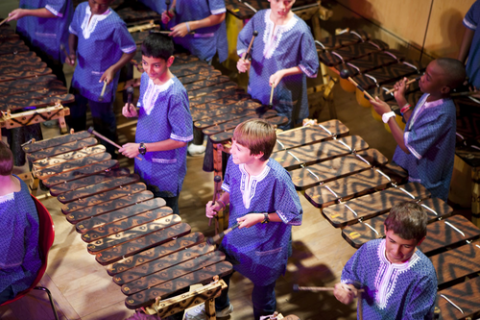
The St. Stithian's Boys' Prep Marimba Band
Photo by Kelly Davidson
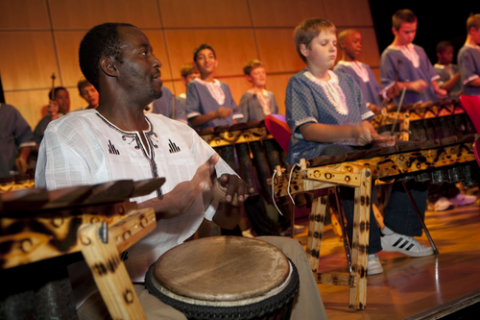
Music educator Michael Sibanda directs the marimba choir.
Photo by Kelly Davidson
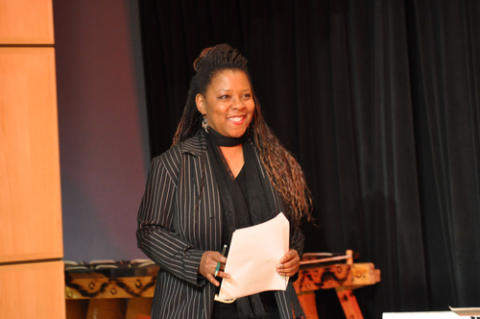
Patrice Rushen cohosted the symposium.
Photo by Kelly Davidson
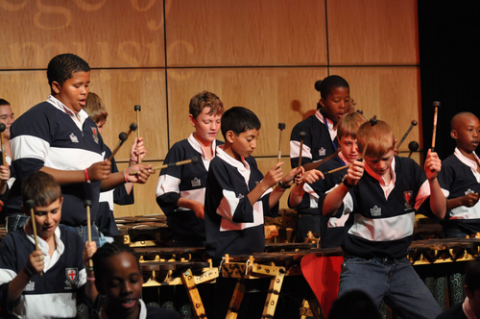
The St. Stithian's Boys' Prep Marimba Band
Photo by Phil Farnsworth
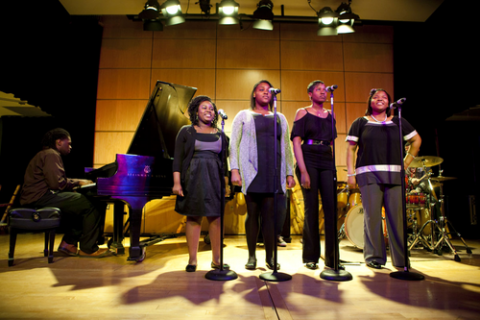
The Boston Arts Academy Ladies First Ensemble
Photo by Kelly Davidson
Berklee's Music Education Symposium in April offered music educators many opportunities to discuss best practices with their colleagues, but one panel discussion gave the assembled music teachers the chance to hear directly from students. The featured students represented a wide variety of ages, races, nationalities, income levels, and musical levels, yet the message they offered was remarkably consistent.
The Music in My Life, Music in Your Life panel discussion featured three Berklee music education students, three high school students from the Boston Arts Academy, and three middle school students from St. Stithian's Boys' Prep School in Johannesburg, South Africa. Pianist, composer, and music educator Patrice Rushen, along with Music Education Department chair Cecil Adderley, asked the students questions about how music education has affected them. Below are excerpts of the discussion.
Patrice Rushen: How has being involved with music changed your life?
Alissa Coates (Berklee): Being involved in music has actually more taught me leadership than anything else. Since I've been at Berklee I've had the opportunity . . . to meet people, learn how to be up in front of a classroom, learn how to lead a band, and just become more confident in what I'm doing and who I am.
Latoya Devonish (Berklee): I come from the South Bronx. It has a lot of stereotypical activities, from gang violence to drugs to teen pregnancy—it's just everywhere. So for me, music has kept me out of trouble. It's given me a way to say my environment doesn't make who I am.
Patrice Rushen: What aspects of the way you have been taught music do you find are most effective?
Latoya Devonish (Berklee): I think the rote technique is super important in all grades. I do it, now you do it. It puts everybody on the same playing field.
Jordan Maley (Berklee): With any teacher, music or otherwise, I find that honesty is the most important thing. Being honest with myself about how I'm progressing, having teachers honestly assess what I'm doing, and it's certainly something I want to do when I'm an educator.
Max Ridley (Boston Arts Academy): The most important part of my music education has been ensemble playing, really getting to know the people I'm playing with.
Cecil Adderley: How has improvisation been made easier for you?
Thomas Eichner (St. Stithian's): Well, practice, first of all. Once you get more confident, then you have the time of your life.
Jordan Maley (Berklee): It can be an unbelievably freeing thing. I think there's a huge fear that goes along with it. I really think it's something we all need to get over, because it is a beautiful thing.
Patrice Rushen: Music can be a very solitary kind of thing. What would you say to the teaching community about how we can be a part of this, when you just have to shut down and internalize in order to learn?
Jordan Maley (Berklee): For me, music has been not an escape, but a confrontation. That should definitely be encouraged, the looking at yourself. I think that's something that's valuable not only in music but in other areas of life. Teachers lead by example. We as teachers need to look at ourselves.
Latoya Devonish (Berklee): On the other side, teachers have to show their students that they can do more than they think they can. Most people are usually their worst critics. Educators have to find that balance.
Michael Hinds (St. Stithian's): Last year the marimba ensemble opened a door to a different sort of music. It's fun. So now I'm doing it not just as a hobby.
Thomas Eichner (St. Stithian's): I think that having that not-very-fun experience on the piano, marimba has turned that around, and now I find that music can be lots of fun. Marimba has opened up the door, and maybe I'd like to play other instruments now.
Cecil Adderley: What is performance to you?
Jeremy Armstrong (Boston Arts Academy): Performance for me is a challenge. I'm not a person who puts myself out there. It helps me work with other people.
Alissa Coates (Berklee): I'm terrified of being on stage unless I'm in an ensemble. But once I'm up there and performing, I get done and it's such a high. You're like, wow, I actually managed to accomplish this.
Michael Hinds (St. Stithian's): When we get to the performance, I get really nervous, because I have a fear of messing up. But when I'm playing I lose that fear.
Rushen summed up the discussion with a few points for the music educators to take home with them: They'd received a lot of validation for what they're already doing, like teaching by example, as well as confirmation that there are things they can do better. Some students started on instruments that just didn't work for them, but that should not deny them the musical experience. Inevitable trips and falls happen because music forces you to look at yourself, and teachers are there to reel students in at these key moments. It was a moment of inspiration in a day that pulled the assembled teachers back from their daily work to look at their larger impact.
